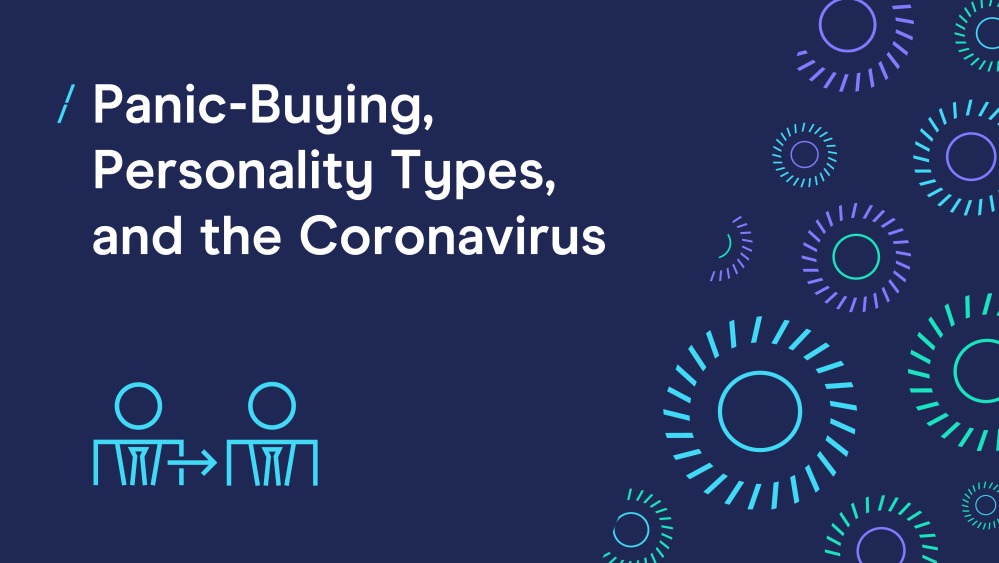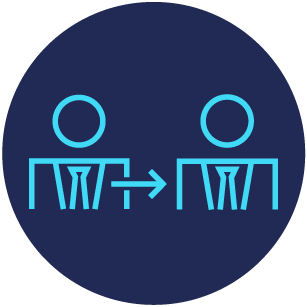Panic-Buying, Personality Types, and the Coronavirus
28 Apr 2020

What do personality types and panic-buying have in common? In this latest blog supplied by our B2B Council, Toby Leader discusses how the two are linked – plus the ways conformity, social media, and fake news play a role.
With the ever-rising threat of the coronavirus sparking fear worldwide, many consumers have been panic-buying and stockpiling essentials, from tinned food to toilet paper.
Although stockpilers may believe their actions are rational, arguing that it’s simply an act of preparation in case of a potential quarantine, others call the panic-buying “crazy” and selfish, as it reduces the availability of essentials for society’s most vulnerable.
Studies show that different personality types react to stress differently, which could explain the varied approaches to dealing with the pandemic. In this sense, one could argue that an individual scoring higher on the scale for Neuroticism and Openness (Ocean Big 5 personality traits) is more likely to ruminate over a shortage of resources, and therefore engage in panic-buying to ensure they have sufficient supplies.
This idea is supported by experts, such as Steven Taylor, clinical psychologist and author of The Psychology of Pandemics, who argues that panic-buying is an attempt to regain control when we experience anxiety and uncertainty. Taylor further elaborates:
“Under circumstances like these, people feel the need to do something that’s proportionate to what they perceive is the level of the crisis… This is a dramatic event, therefore a dramatic response is required, so that leads to people throwing money at things in hopes of protecting themselves.”
This rush to stockpile may also be related to conformity, as when individuals find themselves in uncertain situations, they tend to let others’ actions support their decisions. This creates a herd mentality, where individuals ignore their own inhibitions and copy the actions of the surrounding group, as they believe it’s the safest and most effective option.
It’s likely social media influences this herd mentality, as the increased connectedness it provides offers individuals additional frames of reference to conform to. This is particularly important, as not all information through social media is accurate, with many sites like Facebook acting as soapboxes for fake news outlets – inciting greater fear, supporting conspiracy theories, or suggesting potentially dangerous alternative solutions.
Despite the abundance of information on social media, people can only process a limited amount before falling victim to cognitive overload. The amount of information potentially overcomplicates stories, and makes room for fake news, which often attracts readers’ interests and attention by offering simple solutions to difficult problems.
Studies suggest that people’s tendency to spread and engage with fake news is linked to personality traits, such as extroversion. Some individuals are more attuned to accept and share such news, which may exaggerate the truth, encouraging shoppers to take serious action to protect themselves.
This has impacted shoppers around the world: in Japan, stories spread of toilet paper running out, as the country’s entire supply is supposedly imported from China. Japanese politicians had to publicly announce that these claims were false to calm stockpiling shoppers.
However, this type of decision-making isn’t just based on herd mentality, but also competition for scarce resources. Consumer psychology experts argue this form of panic-buying is often self-perpetuated.
If shoppers witness others panic-buying, this will likely alert them of potential upcoming shortages of essential resources, such as toilet paper and hand sanitiser. To ensure they don’t run out, their rational decision is to stockpile, which may trigger panic-buying by other consumers, leading to self-perpetuated shortages.
After contemplating the significance and symbolism of panic-buying toilet paper, our Behavioural Scientist, Bianca Indipendente, revealed that she understood it as an object of collective projected fears. Toilet paper potentially represented our vulnerability and need to feel safe from possible contagion.
Furthermore, as shoppers are running to supermarkets to stockpile, onlookers satirise these actions and create social media trends. Indipendente suggests this dichotomy of behaviour could represent different coping mechanisms in response to anxiety.
Most experts believe that panic-buying will slow in the coming days. Those who’ve already stockpiled can rest on their laurels, dissipating the rush. However, as the WHO has recently classed the coronavirus as a pandemic, it’ll be interesting to see the impact and if the worst is still to come.
The original article, written by Toby Leader, can be found here.
Other blog posts examining the current situation from a behavioural science perspective include:
- Is Your Personality Type Suited Towards Working from Home?
- Coping with Isolation: Extraverts vs Introverts
For more information on the coronavirus, check out the DMA’s Coronavirus: The Daily Digest and Coronavirus: Advice and Help. From important Government updates to support for your business and other valuable resources.

Please login to comment.
Comments